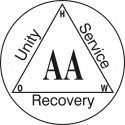Researchers see promise in treating addictive behaviors with mindfulness meditation
When the stresses of life become too much for him, Ken Volante takes a figurative step back and tries out being SOBER. That “nice little trick,” as he describes it, is the backbone of mindfulness meditation and it helps him remain sober.
It’s a series of steps that allows him to cope with the cravings that would lead him to drink. So important is this practice that he carries with him a laminated card listing those steps.
When he practices being SOBER, he Stops, Observes what’s going on, focuses on his Breathing (divorces himself from what’s going on around him), Expands (focus what’s happening to one’s body) and Responds (but constructively).
A binge drinker for two or three years, Volante, of Madison, recently completed an outpatient program at New Start and became part of a pilot study to see whether mindfulness meditation could help alcoholics remain sober and cope with their addiction. The research project is led by Aleksandra Zgierska, a physician at the University of Wisconsin School of Medicine and Public Health.
Mindfulness meditation is closely identified with Jon Kabat-Zinn, a professor emeritus at the University of Massachusetts Medical School who founded a stress reduction clinic devoted to using mindfulness meditation.
The 19 people in the UW study took an eight-week course in mindfulness meditation, in which they learned how to be “present in the moment and be receptive to what is happening, without judgment imposed, just observing what’s there,” Zgierska says.
Doing that, she says, breaks the “auto-pilot” behavior that can lead to impulsive, unhealthy reactions.
“Let’s say a person has a lapse, they have one night of drinking or they have one drink. It’s not unusual for us to hear people in treatment say, ‘What I said to myself is that I screwed it up now. I might as well go ahead and finish it off.’ What mindfulness can do is interrupt that way of thinking,” says Michael Waupoose, program director at UW Health-Gateway Recovery in Madison.
Alcoholics, says Zgierska, when confronted with a situation that could lead to drinking – for example, passing a bar or being offered a drink – could rely on using the SOBER technique, or another approach, such as what’s called urge surfing.
Urge surfing is imagining the urge to drink as a wave, and imagining oneself riding the wave and coming down the other side, says Alan Marlatt, director of the Addictive Behaviors Research Center at the University of Washington in Seattle.
Study results awaited
How mindfulness meditation helps alcoholics deal with their desire to drink remains uncertain.
“That’s the big question everyone is trying to get a handle on,” says Marlatt, who has also been studying mindfulness meditation and consulted with Zgierska on her study.
But he does contrast it with other approaches to alcoholism.
“The traditional kinds of behavioral treatment like aversion therapy tried to suppress urges or inhibit cravings or create a condition of aversion to them. Mindfulness is radically different. Let’s take an acceptance approach. You will have urges, you will experience cravings, but we’re going to teach you strategies so that you can manage them and get through them,” Marlatt says.
“I think that it has great potential for the treatment of substance abuse disorders,” says Waupoose.
This is a new approach that clients and clinicians are excited about, says Sarah Bowen, a research scientist at the Addictive Behaviors Research Center in Seattle.
For one thing, it’s an alternative to the traditional so-called 12-step group approach used by Alcoholics Anonymous. It was that alternative that attracted Margee Baxter of Baraboo to mindfulness meditation.
“I’ve done the whole AA thing before. I’m not a real rigid follower. I just kind of like to do my own thing in my own order,” says Baxter, 51, who adds that she had trouble finding a group setting in which she felt comfortable.
Early success
Zgierska’s study was a pilot study, which did not involve a control group, but rather sought to examine how feasible the mindfulness approach would be for alcoholics.
In the first controlled study comparing mindfulness with a 12-step approach, Bowen and her colleagues found that alcoholics and drug users using mindfulness meditation reduced the number of days they used drugs or drank to fewer than half the number of days of those in the 12-step group after two months (2.1 compared with 5.4). But the difference disappeared after four months.
The researchers explain the result by noting that after the initial course in mindfulness, the participants went back to the 12-step groups.
“It is therefore not surprising that MBRP (Mindfulness Based Relapse Prevention) treatment gains were not fully maintained,” the researchers write. They add that mindfulness training may require continuing support to be successful.
The study began with 93 people who used mindfulness meditation and 75 who participated in the 12-step program. At the study’s conclusion, 69 were in the mindfulness group, 49 in the 12-step group.
The results of the study, published late last year in the journal Substance Abuse, should enhance the scientific credibility of mindfulness meditation as a treatment for alcoholism and other addictive disorders, says Bowen. She adds that as an approach it has drawn the interest and praise of many professionals who treat these disorders.
“This provides us yet another opportunity to say, ‘Here is another intervention that has been studied and outcomes are favorable.’ It gives us another tool we can use for treating substance abuse disorders,” Waupoose says.
Bowen says such findings may also increase the use of the technique.
“We may be able to have programs like this integrated into and covered by large organizations, such as the VA,” she says.
Zgierska says she plans on doing further controlled studies of mindfulness meditation. And Waupoose says he aims to introduce the technique to the treatment programs at UW Health-Gateway Recovery.
source: Milwaukee Journal Sentinel

